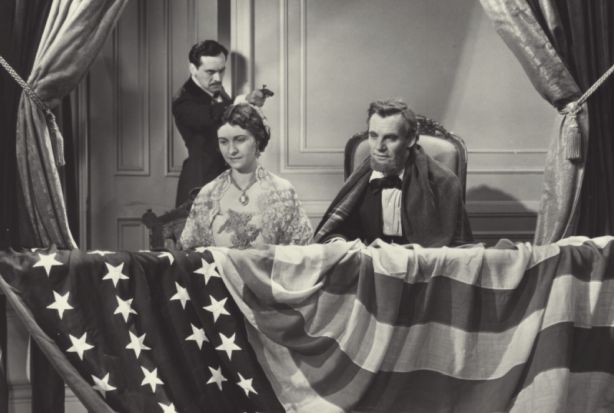
Historian Richard Wightman Fox, contributor to the Abraham Lincoln Presidential Library and Museum’s blog and author of the recently published book
Lincoln’s Body (W.W. Norton, 2015), made a presentation called “Living and Dying for the Nation” April 16 at the Union Theater in the Lincoln museum as part of the presidential library’s commemoration of the 150 th anniversary of the Civil War’s end and Lincoln’s death and funeral.
According to Fox’s presentation, there have been 300 portrayals of Lincoln in film, starting in 1901, a figure he credits to Mark Reinhart’s 2012 book Lincoln on Screen. Fox stated the belief that while Lincoln is remembered mainly through his words, and whereas photos freeze Lincoln in a single moment, it is the cinematic, fictionalized portrayals of the Great Emancipator which truly “bring him alive.”
Fox showed three extended clips during the evening, preceded and followed by indepth discussion of the circumstances of the films themselves and what they say about Lincoln’s legacy. The first clip he showed was from D.W. Griffith’s notorious 1915 epic Birth of a Nation, a choice which he admitted was a complicated one due to the “insidiously racist” aspects of the film as a whole but averring that even 100 years later, Griffith’s remains the “best Lincoln assassination scene ever filmed.”
Some of the most famous Lincoln portrayals were only mentioned glancingly in the presentation, including a trio released between 1930 and 1940 beginning with Griffith’s 1930 Abraham Lincoln, a perhaps overly ambition birth-to-death biopic starring Walter Huston; John Ford’s 1939 Young Mr. Lincoln with Henry Fonda in the part of the Railsplitter and Abe Lincoln in Illinois (1940) starring Raymond Massey, who played Abe from adolescence onward, despite having been in his mid-40s at the time of filming.
One of the more intriguing clips shared by Fox was a segment originally aired on the CBS program Omnibus in 1952, written by esteemed novelist and critic James Agee and with a very young Stanley Kubrick in its crew. The segment, entitled “The End and the Beginning” is a depiction of the actual journey of the funeral train as it made its way from Washington to Springfield, scored with no music, just train sounds and a mournful recitation of Walt Whitman’s “When Lilacs Last in the Dooryard Bloom’d.”
Fox concluded with the final scene of Steven Spielberg’s 2012 Lincoln featuring the Academy Award-winning turn by Daniel Day Lewis. “Lewis has given us a performance for the ages, I believe,” said Fox. “It’s not likely to be outdone in any foreseeable future, it’ll have to be a different slant – maybe a film about Mary Lincoln with Abe seen in the role of husband – but I don’t think anybody’s going to do for Lincoln the president what Daniel Day Lewis has done.”
Scott Faingold can be reached at [email protected].